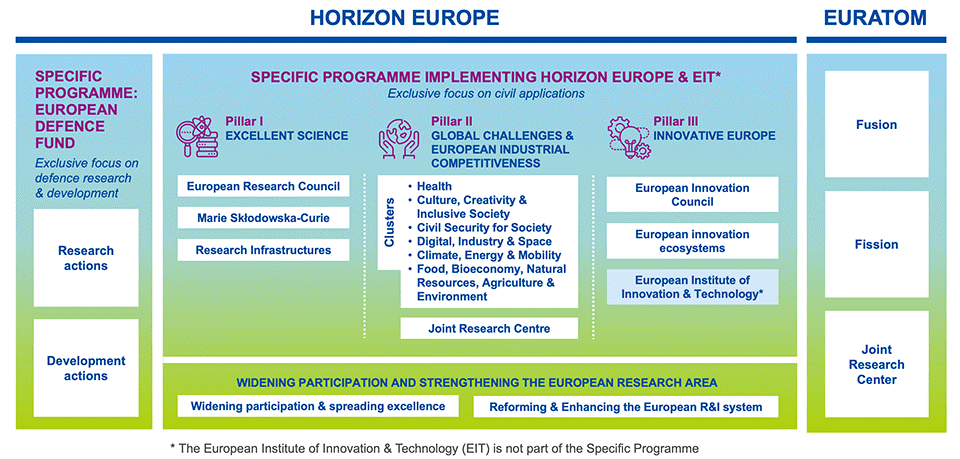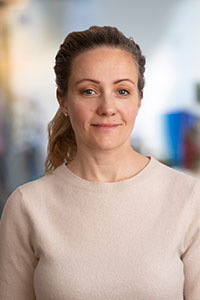Funding opportunities in the area of Digitalisation in Horizon Europe
Green and Digital are two ambitions of the new EU framework programme for research and innovation, Horizon Europe 2021-2027. How is this manifested in the key areas and work programmes and where are the major funding opportunities? This interview with Anna Raask at Research Support Office will give a brief overview of interest for the KTH Digitalization Platform.
A brief introduction to Horizon Europe – there are three main pillars. The first is about Excellent Science and contains the calls for proposals of ERC, Marie Sklodovska Curie Actions (MSCA) and research infrastructures. The third pillar focusses on Open innovation, EIC and EIT. The second pillar contains the large-scale cooperation projects, now called Global Challenges & Industrial Competitiveness. This pillar is mainly intended for boosting key technologies and solutions underpinning EU policies & sustainable development goals, and are clustered into six thematic areas, which all have their own Work Programmes with aims and ambitions.
- Health
- Culture, Creativity and Inclusive Society
- Civil Security for Society
- Digital, Industry and Space
- Climate, Energy and Mobility
- Food, Bio-economy, Natural Resources, Agriculture and Environment


"The Digitalization Platform would certainly be interested in the area of 'Digital, Industry and Space' also called Cluster 4*. This Work Programme contains funding calls, which focus on supporting key enabling technologies that are strategically important for Europe’s industrial future," says Anna Raask, EU Research Advisor and Impact specialist at KTH Research Support Office (RSO), and continues:
"A new concept in Horizon Europe are the Missions , including a set of measures to achieve bold, inspirational and measurable goals within a set timeframe. There are five main mission areas as part of Horizon Europe. How these will work in concrete terms, is yet to be seen."
Open Science and Impact are key elements of the Horizon Europe programme
There is a strong focus on Open Science policy, i.e. a mandatory open access to publications and open science principles are applied throughout the programme. In addition, maybe interesting for some of our researchers, the new hop-on facility will allow participants from low R&I performing countries to join R&I collaborative actions already selected under Horizon Europe. The scheme aims at achieving the inclusiveness ambition of the future European Research Area (ERA) policy by involving research institutions from countries eligible for widening support under Horizon Europe Pillar 2 actions.
" Impact is strongly emphasized in Horizon Europe," says Anna Raask. "The concept of ‘impact pathways’ is now included in the proposal template. The idea is to make impact visible in a more comprehensive way and really demonstrate the scientific, economic, and societal impacts generated beyond the project. We can also expect there to be more focus on concepts such as citizen science, in order to more effectively engage and show the value of European funded research for the broader public."
In September 2021 an Open Science/Citizen Science workshop (pdf 6.5 MB) was organised by RSO, V&A and Digital Futures.
Application changes with more emphasis on inter-disciplinarity, gender aspects and HSS
When it comes to the actual application process, there are some changes. For example, one of the biggest changes in the Horizon Europe proposal template is the reduction in the number of pages. Project applicants will now have 45 pages to present their project in detail, compared to 70 pages in the previous Horizon 2020 programme.
In the Excellent section, project leaders will also have to demonstrate the inter-disciplinarity of the proposal, showing the relationships between the different expertise or research fields. In addition, the gender dimension must be addressed more consistently by integrating it into the research and innovation activities of the project. Finally, integrating social sciences is becoming essential. Their role must be justified if mentioned in the work programme.
Some other novelties are that all the participants will now have to specify whether participating organisation has a gender equality plan, as well as a table of researchers involved in the project will have to be filled in. This table has been included as an indicator for the monitoring of the Horizon Europe programme. It does not aim at identifying researchers but rather studying the link between funding and its influence on researchers’ careers.
RSO support for KTH researchers in applying for funding and running EU Projects
A strategy document for KTH: s successful participation in Horizon Europe builds on an evaluation of the success factors from the previous programme and we have a good understanding on how we can enhance our participation and extend our influence in the outcomes of Horizon Europe.
"Our team of Research advisors at KTH Research Support Office organise seminars and information sessions related to Horizon Europe during the whole programme period. We offer advice and guidance in the application stage, as well as support you if you are lucky enough to receive the grant. We have developed tools and processes to support our researchers in the application stage, such as the One Page –proposal tool and Proposal Development Workshop, including a canvas tool for communication and impact for European proposals, forthcoming."
Seminar themes include: Introduction to Horizon Europe, Citizen Science and Open Science, Gender issues and Ethics, European Research Council (ERC) grants, Marie Skłodowska-Curie Actions (MSCA). Find more information about RSO support in the application phase, on the Research Support pages of KTH Intranet .
"The new RSO team of Project Managers can also offer professional assistance with project coordination, follow-up and reporting in accordance with the funding agency’s requirements and in line with local and national rules. This support is primarily for EU-funded collaborative research projects and is foreseen to ensure high quality in KTH's management of EU projects. Its scope depends on the project type, its size and activities. It also depends on the project leader's level of experience and need for support."
"So, please contact RSO for support and take a look at the following advice and tips," concludes Anna Raask.

